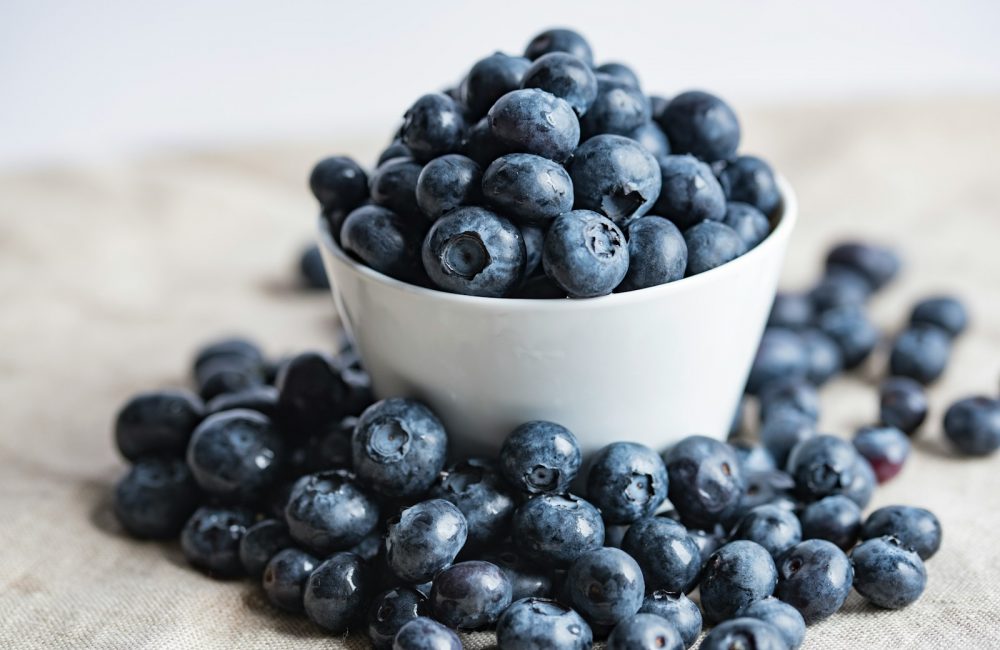Antioxidants play a crucial role in protecting the body from oxidative stress, which occurs when harmful free radicals—unstable molecules that can damage cells—accumulate in the body. Free radicals are produced naturally through metabolism but can also result from external factors like pollution, smoking, and poor diet. Over time, oxidative stress can lead to chronic diseases such as heart disease, cancer, and neurodegenerative disorders.
Consuming a diet rich in antioxidant foods can help neutralize free radicals, reduce inflammation, and support overall health. Antioxidants include vitamins like vitamin C, vitamin E, and beta-carotene, as well as polyphenols and flavonoids found in various plant-based foods. In this article, we’ll explore the 14 best foods that can help strengthen the body’s antioxidant defense and promote long-term health.
1. Blueberries
Blueberries are often referred to as a superfood due to their high antioxidant content, particularly anthocyanins, which give them their vibrant blue color. These powerful antioxidants help protect cells from oxidative damage and reduce inflammation, which can lower the risk of chronic diseases like heart disease and cognitive decline.
In addition to anthocyanins, blueberries are rich in vitamin C and vitamin K, both of which play important roles in supporting immune function and reducing oxidative stress. Regularly consuming blueberries, whether fresh or frozen, can help boost your body’s antioxidant defense and promote better overall health.
2. Dark Chocolate
Dark chocolate, especially varieties with a high cocoa content (70% or higher), is packed with flavonoids—a group of antioxidants that protect the body from free radical damage. Flavonoids, particularly catechins, help improve blood circulation, lower blood pressure, and reduce the risk of cardiovascular disease.
The antioxidants in dark chocolate also support brain health by improving cognitive function and protecting neurons from oxidative stress. Consuming a small piece of dark chocolate daily can provide a delicious way to enhance your body’s antioxidant defense while enjoying its heart-healthy benefits.
3. Spinach
Spinach is a nutrient-dense leafy green that provides a significant amount of beta-carotene, vitamin C, and vitamin E—all of which are potent antioxidants that reduce oxidative stress and inflammation. Beta-carotene, a precursor to vitamin A, helps protect the skin and eyes from damage caused by free radicals, while vitamin C supports immune function.
Spinach is also rich in lutein and zeaxanthin, two antioxidants that specifically protect the eyes from damage caused by UV light and oxidative stress, reducing the risk of cataracts and age-related macular degeneration. Incorporating spinach into your diet through salads, smoothies, or sautés can provide a boost to your body’s natural defenses.
4. Green Tea
Green tea is one of the most potent sources of antioxidants, particularly epigallocatechin gallate (EGCG), a type of catechin that has been shown to reduce inflammation, protect cells from oxidative damage, and support heart health. EGCG has been studied for its ability to reduce the risk of various chronic diseases, including cancer, heart disease, and diabetes.
In addition to EGCG, green tea contains other catechins and polyphenols that further strengthen the body’s antioxidant defense. Drinking 1-2 cups of green tea daily can help support metabolic health, improve mental clarity, and provide a significant dose of antioxidants.
5. Walnuts
Walnuts are a rich source of polyphenols, which are powerful antioxidants that help reduce inflammation and protect the body from oxidative stress. Polyphenols in walnuts are particularly effective at preventing free radical damage to the heart and brain, reducing the risk of cardiovascular disease and cognitive decline.
In addition to polyphenols, walnuts are high in omega-3 fatty acids, which have anti-inflammatory properties that support overall health. Including a small handful of walnuts in your daily diet can provide a healthy boost to your antioxidant defenses while also promoting heart and brain health.
6. Kale
Kale is another leafy green vegetable that is packed with antioxidants, including vitamin C, beta-carotene, and quercetin, a flavonoid that has anti-inflammatory and immune-boosting properties. Kale is particularly high in vitamin K, which is essential for bone health and plays a role in reducing oxidative damage.
In addition to these antioxidants, kale contains sulforaphane, a compound that supports detoxification and protects cells from oxidative stress. Regularly incorporating kale into your diet can help protect against chronic diseases and strengthen your body’s ability to neutralize free radicals.
7. Tomatoes
Tomatoes are rich in lycopene, a powerful antioxidant that gives tomatoes their red color. Lycopene has been extensively studied for its ability to protect against oxidative damage, particularly in the skin and prostate. It is especially effective at reducing the risk of prostate cancer and protecting the skin from UV-induced oxidative damage.
In addition to lycopene, tomatoes contain vitamin C and beta-carotene, both of which support immune function and protect cells from free radical damage. Cooking tomatoes enhances the bioavailability of lycopene, making tomato-based dishes like sauces and soups a great way to boost your antioxidant intake.
8. Strawberries
Strawberries are another excellent source of antioxidants, particularly vitamin C and anthocyanins. These antioxidants help reduce oxidative stress, lower inflammation, and support immune health. The high vitamin C content in strawberries helps protect skin health, promoting collagen production and reducing the appearance of wrinkles caused by free radical damage.
Strawberries also contain ellagic acid, an antioxidant that has been shown to have anti-cancer properties and protect against chronic diseases. Adding fresh or frozen strawberries to smoothies, yogurt, or salads can provide a delicious and nutritious way to enhance your body’s antioxidant defenses.
9. Pecans
Pecans are a nutrient-dense nut that is particularly high in antioxidants, including vitamin E and polyphenols. These antioxidants help reduce the risk of oxidative stress and inflammation, supporting heart health and protecting cells from damage. Pecans are also rich in healthy fats and fiber, which contribute to overall well-being.
Incorporating pecans into your diet as a snack or adding them to salads and oatmeal can help improve your antioxidant levels and support cardiovascular health.
10. Oranges
Oranges are famous for their high vitamin C content, one of the most well-known antioxidants that help protect the body from free radical damage. Vitamin C supports immune function, helps the body repair damaged tissues, and promotes healthy skin by reducing oxidative stress and inflammation.
In addition to vitamin C, oranges contain flavonoids, such as hesperidin, which have been shown to reduce inflammation and support heart health. Drinking freshly squeezed orange juice or eating whole oranges regularly can provide a refreshing and effective way to strengthen your antioxidant defense.
11. Raspberries
Raspberries are packed with ellagic acid and quercetin, both of which are powerful antioxidants that help protect cells from oxidative stress and reduce inflammation. These antioxidants have been shown to support heart health, protect the skin from UV damage, and lower the risk of chronic diseases like diabetes and cancer.
Raspberries are also rich in fiber, which supports digestive health and helps regulate blood sugar levels. Including raspberries in your diet, whether fresh or frozen, can help enhance your antioxidant intake and promote better overall health.
12. Carrots
Carrots are an excellent source of beta-carotene, an antioxidant that is converted into vitamin A in the body. Beta-carotene helps protect the skin from oxidative damage caused by UV rays and supports eye health by reducing the risk of age-related macular degeneration.
Carrots also contain lutein and zeaxanthin, two antioxidants that specifically protect the eyes from oxidative stress and improve vision. Incorporating raw or cooked carrots into your meals can provide a significant boost to your antioxidant defenses and support eye and skin health.
13. Avocados
Avocados are rich in vitamin E, a powerful antioxidant that protects cell membranes from oxidative damage. Vitamin E is particularly important for skin health, helping to reduce the effects of aging by protecting the skin from free radicals and promoting collagen production.
In addition to vitamin E, avocados contain glutathione, an antioxidant that helps detoxify the body and neutralize free radicals. The healthy fats in avocados also help improve the absorption of fat-soluble antioxidants like beta-carotene and vitamin E from other foods. Adding avocado to salads, toast, or smoothies can help enhance your antioxidant intake and support overall health.
14. Broccoli
Broccoli is a cruciferous vegetable that is packed with vitamin C, beta-carotene, and sulforaphane—an antioxidant that supports detoxification and protects cells from oxidative damage. Sulforaphane has been shown to have anti-cancer properties, making broccoli an excellent food for reducing the risk of cancer and other chronic diseases.
Broccoli is also rich in vitamin K, which supports bone health and helps reduce oxidative stress in the body. Including broccoli in your diet, whether steamed, roasted, or added to soups, can help improve your body’s antioxidant defenses and promote long-term health.
Antioxidants are essential for protecting the body from the harmful effects of oxidative stress, which can lead to chronic diseases and premature aging. By incorporating these 14 antioxidant-rich foods into your daily diet, you can strengthen your body’s natural defenses, reduce inflammation, and support overall health. From blueberries and dark chocolate to nutrient-dense vegetables like spinach and broccoli, these foods provide a variety of vitamins, minerals, and phytochemicals that work together to protect your cells and promote long-term well-being.
Incorporating a wide range of colorful fruits, vegetables, nuts, and seeds into your meals can help ensure that you’re getting a diverse array of antioxidants, which are essential for optimal health. By focusing on whole, nutrient-dense foods, you can support your body’s natural defense mechanisms and enjoy better health for years to come.





